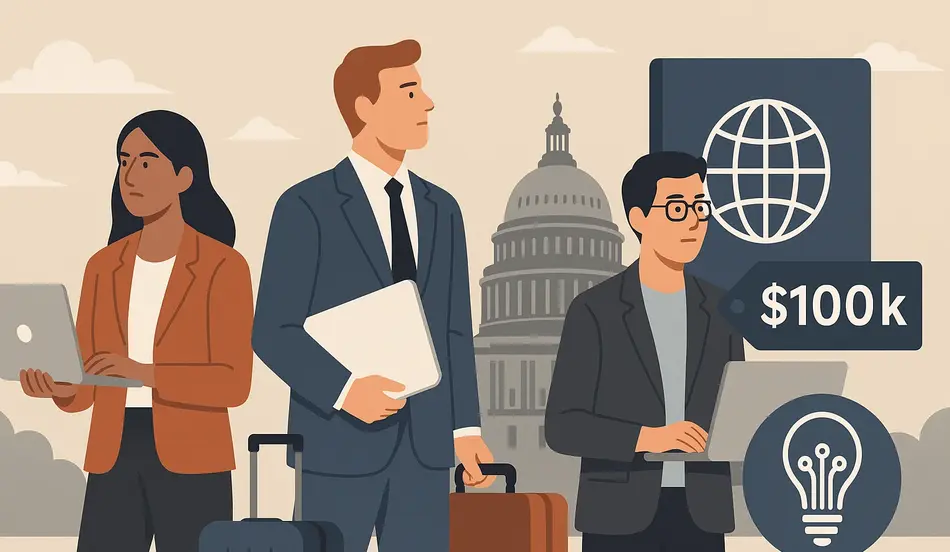Trump’s $100K H-1B visa fee – this destructive new policy announced last week will fundamentally reshape how American businesses recruit talent and could devastate the nation’s competitive advantage in technology and innovation. The Trump administration’s decision to impose a staggering $100,000 fee per H-1B visa applicant starting in 2026 has sent shockwaves through the business community, with immigration experts warning that this move will force companies to relocate operations overseas and lose critical talent to competing nations.
The H-1B visa is the workhorse visa that many professionals work under in the United States. Many of them come to US universities, graduate, and then get jobs in engineering or tech, working under the H-1B visa system. It’s a lottery system with 85,000 visas granted each year, but the new $100,000 fee per applicant will create an insurmountable barrier for most companies, particularly small businesses and startups that rely on this talent pipeline.
The H-1B Visa System: America’s Innovation Engine
The H-1B visa system has been the backbone of American technological innovation for decades, allowing highly skilled foreign workers to contribute to the US economy. These workers often come from top US universities, bringing cutting-edge knowledge and skills that drive innovation, patents, and technological advancement across industries.
The current system operates as a lottery, with 85,000 visas granted annually to highly skilled workers in specialty occupations. These workers fill critical roles in engineering, technology, healthcare, and other fields where there are often shortages of qualified American workers. The system has been instrumental in maintaining America’s competitive edge in the global technology race.
However, the new $100,000 fee per applicant represents a 1,000% increase from current fees, creating an insurmountable barrier for most companies. While large corporations like Google or Netflix might be able to absorb these costs, smaller companies, small businesses, and startups will be completely priced out of the talent market.
The Destructive Impact on American Innovation
The new H-1B visa fee will have devastating consequences for American innovation and competitiveness. Immigration experts warn that this policy will force companies to choose between paying exorbitant fees or losing access to critical talent, with many choosing to relocate operations overseas rather than pay the new fees.
The impact will be particularly severe for:
• Small businesses and startups – Unable to afford the $100,000 fee per employee
• Technology companies – Losing access to highly skilled engineers and developers
• Research institutions – Struggling to recruit top international researchers
• Healthcare organizations – Facing shortages of specialized medical professionals
• Manufacturing companies – Losing access to specialized technical expertise
The policy will also create a brain drain effect, as other countries like Canada, the UK, and even China are already positioning themselves to capitalize on this opportunity. These nations are actively recruiting the talent that America will be turning away, potentially shifting the global center of innovation away from the United States.
The Mass Panic and Confusion
The announcement of the new H-1B visa fee created mass panic among current visa holders and applicants, with many people getting off airplanes and seeking immediate clarification about whether the fee would apply to existing visa holders. The confusion was understandable, as the initial announcement lacked clarity about the implementation timeline.
Fortunately, the Trump administration later clarified that the new fee would only apply to future applicants starting in 2026, with current H-1B visa holders and those already selected for the 2025 lottery being grandfathered in. However, this clarification came after significant disruption and anxiety had already spread through the immigrant community and business sector.
The delayed clarification highlights the chaotic nature of the policy rollout and raises questions about the administration’s planning and communication strategy. The damage from the initial confusion may already be done, as companies and workers are making decisions based on incomplete information.
The Competitive Disadvantage for America
The new H-1B visa fee will put America at a significant competitive disadvantage in the global talent market. While other countries are actively recruiting skilled workers and offering attractive immigration policies, America is essentially pricing itself out of the market with exorbitant fees.
Canada, for example, has been aggressively recruiting tech talent with its Global Talent Stream program, offering faster processing times and more favorable immigration policies. The UK has also been positioning itself as an alternative destination for tech workers, with its Global Talent visa program.
Even China, despite its own immigration challenges, is actively recruiting international talent through various programs and initiatives. The new H-1B fee will make America less attractive compared to these alternatives, potentially leading to a significant loss of talent and innovation.
H-1B Visa Fees and the Future of Innovation
A proposed $100K H-1B visa fee threatens to reshape American innovation, limiting access to global talent and slowing progress. Employers can adapt by expanding their reach and building diverse teams that drive creativity and growth. Post your job on WhatJobs today and connect with skilled professionals worldwide — free for 30 days.
Post a Job Free for 30 Days →The Impact on Small Businesses and Startups
The new H-1B visa fee will be particularly devastating for small businesses and startups, which often rely heavily on H-1B workers to fill critical technical roles. These companies typically operate on tight budgets and cannot afford to pay $100,000 per employee in visa fees.
Small businesses and startups are often the most innovative and dynamic parts of the economy, driving job creation and technological advancement. By pricing them out of the H-1B market, the new policy will stifle innovation and reduce economic growth.
The policy will also create a two-tier system where only large corporations can afford to hire international talent, further concentrating power and innovation in the hands of a few mega-corporations. This could lead to reduced competition and slower innovation across the economy.
The Brain Drain Effect
The new H-1B visa fee will accelerate the brain drain effect, as highly skilled workers choose to pursue opportunities in other countries rather than pay exorbitant fees to work in America. This will be particularly damaging in fields like technology, engineering, and research, where international talent is crucial for maintaining competitive advantage.
The brain drain will not only affect individual workers but also the companies and institutions that depend on them. Universities may struggle to recruit international students and researchers, while companies may lose access to the specialized skills they need to compete globally.
The long-term impact could be devastating, as America loses its position as the world’s leading destination for international talent and innovation. This could have far-reaching consequences for the nation’s economic competitiveness and technological leadership.
The Business Community’s Response
The business community has reacted strongly to the new H-1B visa fee, with many companies already making contingency plans for 2026. Some are considering relocating operations overseas, while others are exploring alternative visa categories or hiring strategies.
The reaction has been particularly strong in the technology sector, where companies rely heavily on H-1B workers for critical technical roles. Many tech companies are already making plans to expand their international operations or relocate certain functions to countries with more favorable immigration policies.
The business community’s response highlights the interconnected nature of the global economy and the importance of immigration policy in maintaining competitive advantage. Companies cannot simply absorb a 1,000% increase in visa fees without making significant changes to their operations and hiring strategies.
The Potential for Policy Reversal
Despite the strong business community reaction, there is some hope that the Trump administration might reconsider or modify the policy. Immigration experts suggest that if the business community reacts strongly enough, Trump might backpedal on the new fee structure.
However, even if the policy is eventually reversed or modified, the damage may already be done. Companies are already making decisions about where to locate operations and how to structure their workforce, and these decisions may be difficult to reverse even if the policy changes.
The uncertainty created by the policy announcement has already had a chilling effect on business planning and investment decisions. Companies are hesitant to make long-term commitments when immigration policy is so volatile and unpredictable.
The Long-Term Economic Impact
The long-term economic impact of the new H-1B visa fee could be devastating for the American economy. By reducing access to international talent, the policy will slow technological advancement, reduce innovation, and weaken America’s competitive position in the global economy.
The policy will also have a multiplier effect, as the loss of skilled workers will reduce productivity and economic growth across the economy. Companies that lose access to H-1B workers may struggle to fill critical roles, leading to reduced output and slower growth.
The impact will be particularly severe in high-tech industries, where international talent is often essential for maintaining competitive advantage. The loss of this talent could lead to a significant decline in America’s technological leadership and economic competitiveness.
Frequently Asked Questions
What is Trump’s $100K H-1B visa fee?
Trump’s $100K H-1B visa fee is a new policy that will impose a $100,000 fee per H-1B visa applicant starting in 2026, representing a 1,000% increase from current fees and creating an insurmountable barrier for most companies.
How will the H-1B visa fee impact American innovation?
The H-1B visa fee will devastate American innovation by forcing companies to relocate operations overseas, losing access to critical talent, and creating a competitive disadvantage compared to countries like Canada and China.
Which companies will be most affected by the new H-1B fee?
Small businesses, startups, and technology companies will be most affected, as they cannot afford the $100,000 fee per employee and rely heavily on H-1B workers for critical technical roles.
Will current H-1B visa holders be affected by the new fee?
Current H-1B visa holders and those already selected for the 2025 lottery will be grandfathered in and not subject to the new fee, which only applies to future applicants starting in 2026.
How are other countries responding to America’s H-1B fee increase?
Countries like Canada, the UK, and China are actively recruiting the talent that America will be turning away, positioning themselves to capitalize on the opportunity and potentially shifting the global center of innovation.
A Real-World Example: Tech Startup’s Dilemma
Sarah Chen, founder of a Silicon Valley AI startup, found herself facing an impossible choice when the new H-1B visa fee was announced. “We have three H-1B employees who are absolutely critical to our product development,” she explains. “They’re brilliant engineers who came to the US for graduate school and have been with us for two years.”
Sarah’s startup, which has raised $2 million in seed funding, simply cannot afford to pay $300,000 in visa fees for her three H-1B employees. “We’re already operating on a tight budget, and this would essentially bankrupt us,” she says. “We’re now seriously considering relocating our entire engineering team to Canada.”
Sarah’s story illustrates the real-world impact of the new policy. “These aren’t jobs that Americans are lining up to fill,” she explains. “We’ve tried to hire locally, but the specialized skills we need in AI and machine learning are incredibly rare. Our H-1B employees are the reason we can compete with larger companies.”
The startup is now exploring options in Toronto, where the Canadian government has been actively recruiting tech talent. “It’s heartbreaking to think about leaving the US, but we have to do what’s best for our business and our employees,” Sarah says. “The new visa fee is essentially forcing us to take our innovation elsewhere.”
Sarah’s story shows how the new H-1B fee will drive innovation and talent out of America, exactly the opposite of what the policy was intended to achieve.
Don’t Let Immigration Policy Destroy Your Business
The new H-1B visa fee represents a fundamental threat to American innovation and competitiveness. While the policy may be intended to protect American workers, it will actually drive talent and innovation overseas, weakening the very economy it’s meant to strengthen.
Companies must act now to prepare for the new reality. Whether through alternative visa categories, international expansion, or developing domestic talent pipelines, businesses need to adapt to maintain their competitive advantage.
The stakes are high, and the time to act is now. Don’t let short-sighted immigration policy destroy your business’s ability to compete in the global economy.




